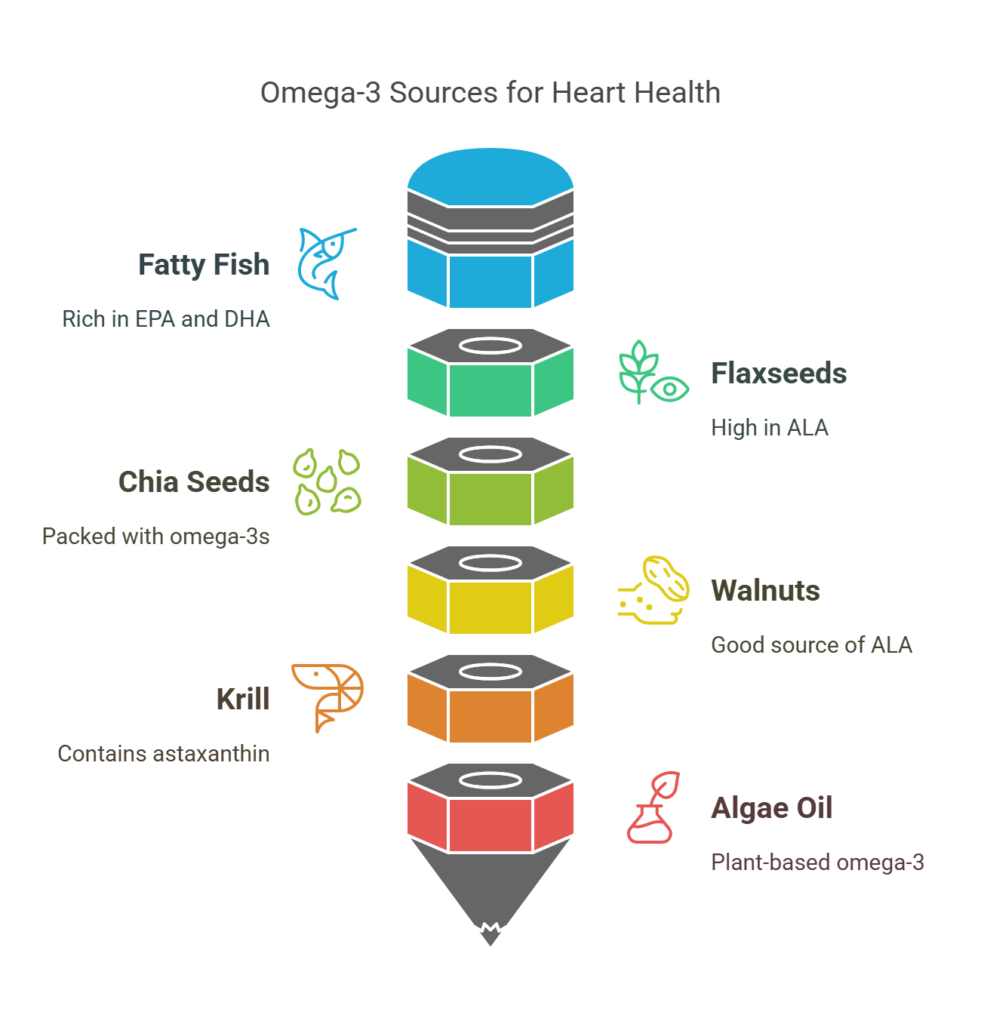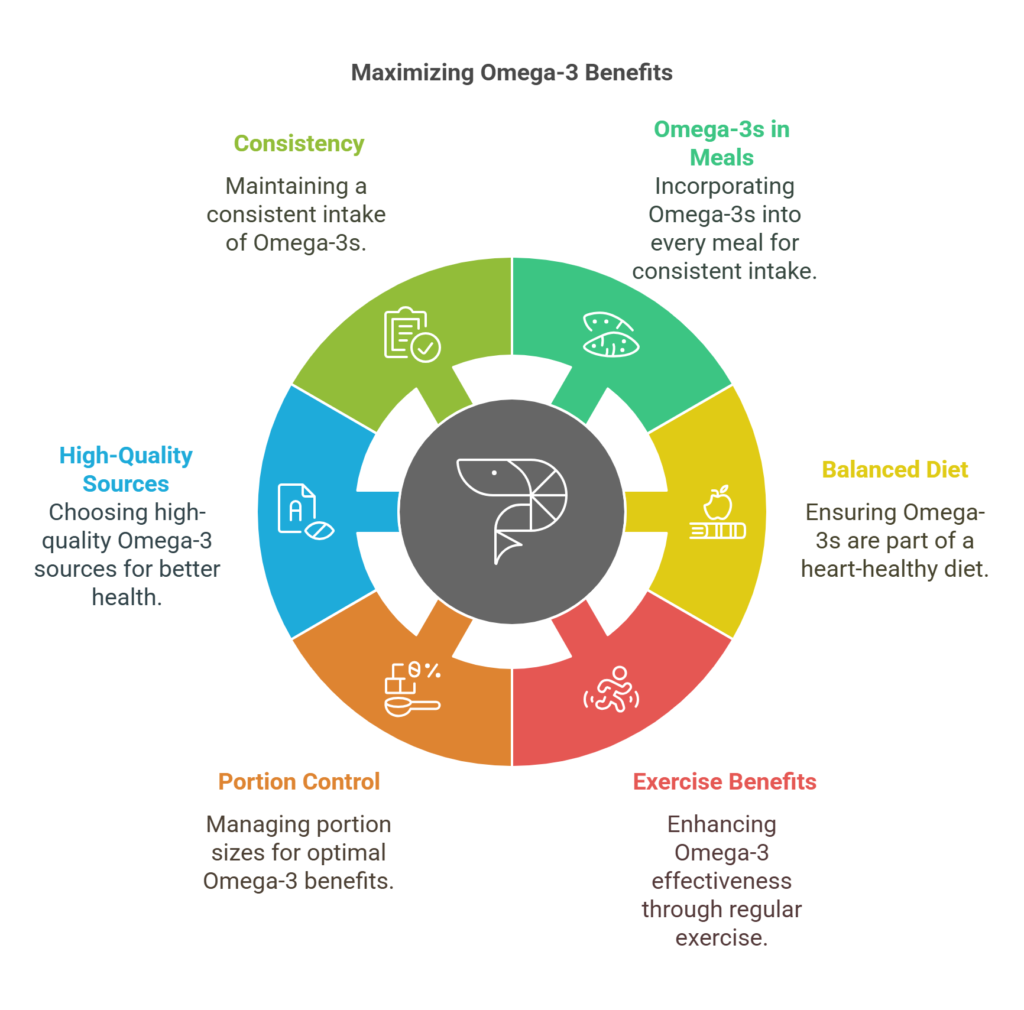When it comes to heart health, managing triglyceride levels is just as important as monitoring cholesterol. While many people rely on supplements or medications, did you know that you can naturally reduce triglycerides by including omega-3-rich foods in your diet?
Omega-3 fatty acids are healthy fats known for their powerful role in lowering triglyceride levels and supporting overall heart health. Think of omega-3s as your body’s natural clean-up crew they help reduce fat buildup in the blood, promoting smooth circulation and a healthier heart.
Whether it’s krill meat, fatty fish, walnuts, or flaxseeds, incorporating omega-3-rich foods into your meals can work wonders for your triglyceride levels. These natural sources offer not only heart-healthy fats but also high-quality protein and other nutrients that help maintain a balanced, sustainable diet.
Now, let’s dive deeper into how omega-3s from various sources can help manage triglyceride levels and promote a healthier cardiovascular system, all while nourishing your body with delicious, nutrient-packed foods.
What Are Triglycerides, and Why Should You Care?

Triglycerides are a type of fat that your body uses for energy. After you eat, any calories your body doesn’t immediately need are converted into triglycerides and stored in your fat cells. Between meals, these triglycerides are released to provide energy.
While triglycerides are essential in small amounts, consistently high levels above 150 mg/dL can have serious consequences for your heart and overall health:
- Heart Disease: Elevated triglycerides contribute to plaque buildup in your arteries, increasing your risk of heart attacks and strokes.
- Pancreatitis: Very high triglycerides can lead to inflammation of the pancreas, causing severe abdominal pain and digestive complications.
- Metabolic Syndrome: High triglycerides are a key marker of this cluster of conditions, which includes high blood pressure, obesity, and insulin resistance.
Fortunately, triglycerides are highly responsive to dietary and lifestyle changes. Among the most effective dietary interventions are omega-3 fatty acids.
How Omega-3s Reduce Triglycerides
Omega-3 fatty acids are powerful, natural fats that play a crucial role in controlling triglyceride levels in the body. Triglycerides, a type of fat found in the blood, are primarily produced by the liver, often in response to excess calories, sugars, or alcohol.
Omega-3s help curb this production by influencing the enzymes in the liver responsible for fat synthesis, essentially reducing the amount of triglycerides the liver makes. But omega-3s don’t stop there. They also boost the body’s ability to break down and eliminate triglycerides from the bloodstream. By speeding up the process of fat metabolism, omega-3s help prevent the accumulation of triglycerides, ensuring a healthier, more efficient circulation system.
Moreover, omega-3s reduce the production of very low-density lipoproteins (VLDL), particles that transport triglycerides in the blood. High VLDL levels are closely linked to an increased risk of heart disease, so by lowering these levels, omega-3s reduce triglyceride concentrations and decrease the likelihood of developing cardiovascular issues.
In essence, omega-3s help manage triglyceride levels by both reducing their production and increasing their removal, making them a vital component for heart health and overall well-being.
Sources of Omega-3s That Reduce Triglycerides
Here are some key sources of omega-3s that can help lower triglyceride levels and support overall heart health:

- Fatty Fish (Salmon, Mackerel, Sardines, Anchovies):
These fish are rich in EPA and DHA, the two omega-3s most effective at reducing triglyceride levels. Consuming fatty fish helps lower fat production in the liver, boosts fat metabolism, and reduces inflammation, all contributing to healthier triglyceride levels.
- Flaxseeds:
Packed with ALA (alpha-linolenic acid), a plant-based omega-3, flaxseeds are a great choice for vegetarians and vegans. While the body must convert ALA into EPA and DHA, flaxseeds still offer substantial heart health benefits by improving fat breakdown and reducing triglycerides over time.
- Chia Seeds:
These tiny seeds are another plant-based source of ALA. Rich in fiber and antioxidants, chia seeds help regulate triglyceride levels and support overall cardiovascular health by improving fat metabolism and reducing blood fat accumulation.
- Walnuts:
A handful of walnuts provides a solid amount of ALA and heart-healthy fats. Walnuts are shown to reduce inflammation and help lower triglyceride levels, making them a great snack for those looking to support heart health.
- Krill:
Krill meat and oil both are potent sources of omega-3s, with the added benefit of being bound to phospholipids, making it easier for your body to absorb. Krill also contains astaxanthin, a powerful antioxidant that helps preserve the omega-3s and enhances their ability to lower triglycerides and reduce inflammation.
- Algae Oil:
Algae oil is a plant-based omega-3 source, rich in both EPA and DHA. It’s an excellent alternative for those on a vegetarian or vegan diet, offering all the triglyceride-lowering benefits of fish-derived omega-3s without the fish. Algae oil supports heart health by improving lipid profiles and reducing the risk of cardiovascular disease.
Including these omega-3-rich foods in your diet helps regulate triglycerides by reducing fat production, enhancing fat metabolism, and lowering inflammation. By choosing these nutrient-packed options, you support a healthy heart and improve your overall cardiovascular health.
Why Krill Omega-3s Are Superior for Reducing Triglycerides
Krill meat is a unique and highly effective source of omega-3s for reducing triglycerides. Unlike fish, which contain omega-3s in triglyceride form, the omega-3s in krill meat are bound to phospholipids. This structure makes them easier for your body to absorb, so you get more benefit from smaller doses an efficient way to lower triglyceride levels.
Additionally, krill meat is rich in astaxanthin, a powerful antioxidant that protects omega-3s from oxidation, ensuring they remain effective longer. This antioxidant not only preserves omega-3s but also supports heart health by reducing inflammation, often associated with high triglyceride levels.
Krill meat also provides a cleaner, more sustainable source of omega-3s compared to larger fish. Since krill are lower on the food chain, they accumulate fewer toxins like mercury, making them a safer and eco-friendly choice for your health.
In short, krill meat offers easily absorbed omega-3s, natural antioxidant protection, and a cleaner, sustainable source making it an excellent option for managing triglycerides and promoting heart health.
Tips to Maximize Omega-3 Benefits and Reduce Triglycerides

Make Omega-3s Part of Every Meal
Incorporate omega-3-rich foods, like krill meat, fatty fish, and walnuts, into your daily meals. By adding these foods regularly, you’re giving your body the tools it needs to manage triglyceride levels and improve heart health. Swap calorie-heavy snacks for a portion of krill meat or a handful of walnuts to boost omega-3 intake and feel the difference.
Balance Omega-3s with a Heart-Healthy Diet
Omega-3s are most effective when paired with a balanced diet. Limit sugary foods and processed carbs, which can increase triglyceride levels. Focus on whole grains, vegetables, and lean proteins to create a well-rounded diet that supports your omega-3 intake and promotes heart health.
Exercise to Boost Omega-3 Effectiveness
Exercise enhances the benefits of omega-3s by improving fat metabolism. Even light activity, like walking, helps process fats more efficiently and lowers triglyceride levels. When combined with omega-3s, regular exercise can make a significant impact on your heart health.
Control Portions for Optimal Benefits
While omega-3s are healthy, consuming them in moderation is key. Focus on small, balanced portions to avoid excess calories. A small serving of krill meat or a few walnuts can deliver powerful omega-3s without overloading your system.
Choose High-Quality Sources
The quality of your omega-3s matters. Opt for clean, sustainable sources like krill meat, which offers omega-3s in a highly absorbable form. Whether through food or supplements, choosing quality omega-3 sources ensures you get the full benefits of reducing triglycerides.
Stay Consistent
Consistency is key. Regular, daily intake of omega-3s will steadily help reduce triglycerides and promote heart health. Whether you’re eating foods rich in omega-3s or taking supplements, sticking with it will provide lasting results.
By making omega-3s a consistent part of your daily routine and pairing them with a healthy diet and exercise, you can effectively lower triglycerides and improve your heart health. Simple changes lead to powerful results.
Conclusion
Incorporating omega-3s into your diet is a powerful, natural way to manage triglycerides and boost heart health. Foods like krill meat, fatty fish, flaxseeds, and walnuts provide the essential fats needed for optimal cardiovascular function. Omega-3s reduce triglycerides by lowering fat production, enhancing fat metabolism, and improving lipid balance in the bloodstream.
Achieving heart health is about more than just adding omega-3s. Pairing them with a balanced diet, regular exercise, and portion control maximizes their benefits. By making small, consistent changes, you can lower triglycerides and support long-term heart wellness.
With these simple adjustments, you’re investing in your heart health and overall well-being. Let omega-3s from sources like krill meat be the foundation for a healthier, more vibrant future.








